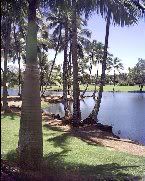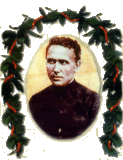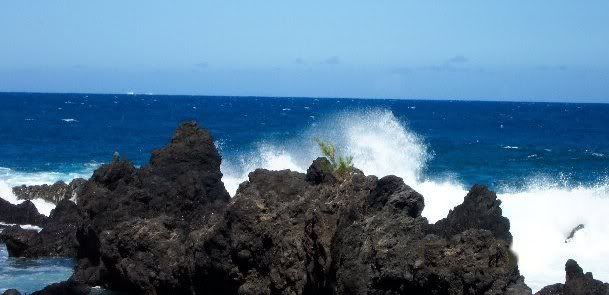

Name~ Hokule'a Kealoha
Short Bio~Hokule'a Kealoha is the Nom De Plume of a writer that formerly lived in Hawaii and is now living a life of adventure on the highways and byways of the American South . I am a Born Again follower of Jesus, as well as a wife, mother of cats and dogs,jeweler, entreprenuer, photographer and pilgrim...
Age~ Old enough to know better
Status~ Newly Single after 13 years of marriage,fur mom to the loving and devoted mini ShihTzu doggie Annabelle, born 6-11-2007 RIP 2-25-09, and the beautiful Abigail born 2-14-09
Hair Color~ natural brown/grey
Mood~ I ALWAYS have a mood, try me...
Loving~ Jesus, Hawaii, my furry friend, Abigail, my Pen Pals, Jewelry ,Blogging ,Writing anything,my Ipod,and being outdoors surrounded by my wonderful natural surroundings
Hating~ Boom Box Cars, Earspray, Abuse of Power,
Reading~
Bible
Magnificat
Link
Link
Underwired! Louisville's magazine for Women
In Store~The Magazine for the American Jeweler
Books in Progress...
CATECHISM OF THE CATHOLIC CHURCH
"Link"
"Link"
Just Finished Reading
"Link"
Link
Link
Link
Jesus, Divine Mercy ~

I Trust In You~
My Favorite Past Posts~Relive The Journey!~
2009~
Link
Link
Link
Link
Link
Link
Link
Link
2008~
Be Thankful
Colateral Damage
Make Lemonade
Home Is Where The Heart Is
The Poor With Us
Because Its The Hardest Thing I Can Do
We Have All Become Victims
Lest I Forget
The Most Important Words
Family Values
Familiar Places
May Perpetual Light Shine On Them
A City In Motion
2007~
The Quiet Storm
Fellowship of the Cane
Like Dead Unremembered: A 9-11 Tribute
The Medicine Machine
One Giant Leap
In The Steps of St. Francis
Too Much Information
The Un Choice
2006~
The Holly and the Ivy
The First 9-11, Dec 7,1941
Small Moments of Silence
Peaches to Winnipeg
Dreaming of Hawaii
Memorial Day
Scattered Values
The White Line is the Lifeline for the Nation
Warnings of a New Civil War
I Will Be True To The Promise I Have Made
The Snowy Bloody Day
Cats in the Cradle
2005~
The Journey
Rebirth of a City
For Posterity's Sake
The New Civil War
Every Mother's Son
And There You Stayed, Temporarily Lost at Sea
The Lone Rider
The Bible Is Not the Fourth Member of the Trinity
Rome Wasn't Built With Union Labor
Happy Birthday Mom ~revised~
A Beautiful Noise
Even Now
The Wearing of the Red
Night Ranger
The Joyful Traveler
Hoiliili "To Gather Up"
Ke Makakilo (My Observations)
He Giveth Sleep
Save The Children
2004~
Lux Aeterna
December 2004
You're Joking, Right?
Ground Zero
I Am Not A Failure
O,To Grace, How Great A Debtor
Lost In Translation
One Small Step for Man
The Rainbow's End
Profanity
Taps
The Journey
Makoa's Song
No Aloha For The Weakest
The Paradoxical Comandments
The Time Is Now
2003~
When No Fruit Is On The Vine


St. Edith Stein~Pray for Us
Religion Link List~
My Secret is Mine
Ignatius Insight-Online Magazine
Fr John Corapi SOLT
Dr. Scott Hahn St Paul Center
Fr. Mitch Pacwa~ Ignatius Productions
Link
Link
Link
Link
Link
Political Link List~
Link
Link
Link
link
Arkansas Link List~
Little Portion Hermitage
John Michael Talbot website
John Michael Talbot Myspace page
1st United Methodist Church Bella Vista
Northwest Arkansas Guide
Mimi's Cafe
Metro Woman Business Directory of NW Arkansas
River Grille
Link
Link
Link
Interactive Links~
Live WebCam Feed from the Mauna Lani Resort, Kohalla, Big Island of Hawaii
Click here for Aloha Joe!Live Hawaiian Music 24/7

St. Damien of Molokai'i, Patron of Hawaii and the Outcasts among us, pray for us....

Hawaii Links~ ~
For more Hawaii links Click Here
Volcano Updates (Pele's Mood Meter)Hawaii Volcano Observatory
Hawaii Volcanoes National Park
Volcano Watch Archives
Mauna Kea Observatory
Pacific Tsunami Museum
Link
Link
Link
Link
Technorotica for Blogging~




Who Links Here...Click here to see who's linking to this site. Powered by WhoLinksToMe.com
Globe of Blogs~Blog search engine
The Blog Search Engine
stock xchng
Photobucket
BlogSkins
Link
Wikipedia
Nuzio's Place on the Web
Commutefaster.com
PING ME!
MWBS Wordpress Edition
Link
Technorotica for Jewelers, and the Jewelry Trade~
Gemological Institute of America
The Drouhard National Jewelers School
The Conner School
Link
Link
|
August 17, 2004
Path of the Ancient Ones
 lava flow tiles 
I pulled this off the Trib as it is a great article about HVNP. Enjoy!
Ancient footprints lead to a beginning
Sunday, August 15, 2004 8:59 AM HST
Mauna Iki Trail ventures into the backcountry of Hawaii Volcanoes National Park
By ALAN D. McNARIE
Tribune-Herald correspondent
The Footprints Trail in Hawaii Volcanoes National Park isn't what it used to be. But there are still some good reasons to walk down the trail, which starts at the Ka'u Desert Trailhead near the 48-mile marker on the Hawaii Belt Road (Highway 11) a few minutes south of Namakani Paio Campground.
Most of the reasons for hiking this trail lie in the country beyond. Short, tame, well-known Footprints Trail provides a shortcut to some of the wildest, least-known, least-traveled areas in the park.
The Footprints Trail leads to one of the park's more unusual features: footprints preserved in wet volcanic ash that set like plaster. The park erected a little shelter house over them with interpretive signs linking them to a famous historic event: the death of a large party of warriors who supported Keoua, the Ka'u chieftain who once challenged Kamehameha the Great's rule over the Island of Hawaii.
While returning home from a battle near Hilo, the party was marching south of Kilauea Crater when a cloud of poisonous volcanic gas decended and wiped out the war party -- an event that seemed to signal Madame Pele's disapproval of Keoua's cause. The chieftain later became a human sacrifice at the dedication of Kamehameha's war temple in Kawaihae.
The park's small shelter has proved ineffective at protecting the fragile footprints, now badly damaged by vandalism, erosion and neglect. (The guidebook "Hawaii: The Big Island Revealed" claims that the damage was done by water condensation from glass installed to protect the imprints. But the footprints have deteriorated even more since the glass disappeared -- and have been joined by the fresh prints of an oafish tourist or two.)
And the footprints, it turns out, may not date from the time of the eruption that killed Keoua's warriors. For that matter, Hawaiians have been traveling to Kilauea Crater for centuries to pay their obeisance to Madame Pele, and probably have left footprints in the ash on more than one occasion. Another set of prints, which the shifting sands recently revealed near the trail a short distance beyond the shelter, point not to Ka'u, but directly toward the crater.
Note: those thin, plaster-like layers of volcanic mud surfacing among the sand strata are extremely fragile, and you don't know what imprints may still lie just under the sand. That's why, especially here, it's imperative to STAY ON THE TRAIL!
Past the footprints shelter, the trail continues another mile where it runs into the Ka'u Desert Trail, one of the park's longest, which leads into the heart of its namesake desert.
Visitors venturing beyond this point should have at least a couple of liters of water, as well as sturdy shoes, hat, sun block, and, for overnight trips, a backcountry permit from the park.
The first prominent landmark on this trail is Mauna Iki ("Little Mountain"), a Mauna Ulu-like lava dome that looms to the east, perching like an enormous black limpet on the shoulder of Kilauea. Mauna Iki is only "little" in relation to its parent volcano; for a puny human walking up its side to its 3,032-foot summit, it's immense enough. The mini-mountain's volcanic shield is long and low-slung, composed almost entirely of relatively smooth pahoehoe lava. A single, jagged a'a flow wells from its side like crusted black blood from a geologic wound. The trail stays well to the left of that flow, and the relatively gradual slopes ensure that the climb isn't that strenuous.
Mauna Iki one of those mountains that disappears as you get closer; you don't realize you're on it until you suddenly notice that you can't see it anymore, but that the panorama around you is getting wider and wider.
That panorama is one of best reasons for making this hike. By the time you reach the Mauna Iki-Ka'u Desert Trail junction near the lava dome's summit, you can see all the way from South Point to the cliffs around Kilauea Crater, where the Jaggar Volcano Observatory perches, almost too small to see without binoculars.
A more spectacular view, however, is to the west, where the largest single volcanic landmass on earth stretches out in all its massive glory. Mauna Iki is one of the few places on the island where you can see most of Mauna Loa's 70-mile-long bulk at once.
The skyscape of this place is almost as spectacular as the landscape. You can actually see the mountains shape the atmosphere. To the north, on a typical afternoon, are the crowded tops of puffy cumulous clouds pushed up against the side of Kilauea by the trade winds. Too heavy with moisture to rise, they amass until they dump their rain on the forests. Higher clouds and silvery vog wreath the summit of Mauna Loa. Overhead, the updraft from the mountain splits high stratus clouds into radiating white streamers.
That atmospheric sorting is one reason why this is called the Ka'u Desert. Most of the rain simply doesn't make it here. The other reason is the volcanic landscape itself. While Ka'u gets more rain than a typical desert, the cracked lava and porous dunes of volcanic sand simply don't encourage surface water to stay around. It either runs off, seeps down, or sizzles away. The a'a flows around the Footprints Trail retain enough water to allow some stunted ohia trees, but on the pahoehoe slopes of Mauna Iki, life has shrunk to a few sword ferns and an occasional 6-inch 'ohelo or pukiawe bush, clinging tenaciously to a sheltering lava crack.
From the trail junction on the Mauna Iki summit, several choices present themselves. You can turn north, where the Mauna Iki and Ka'u Desert Trails run together for about .7 mile before diverging again. From that junction, the Ka'u Desert Trail heads a little over six miles back to Kilauea Caldera and the Crater Rim Trail. The Mauna Iki Trail turns more easterly, toward the Pit Craters, then heads on to a trailhead on Hilina Pali Road.
But the most unlimited possibilities lie south, where the Ka'u Desert Trail plunges deeper into its namesake desert, toward the Kamakaia Hills. This is truly the park's backcountry.
Like better-known Mauna Ulu on the Crater Rim Road, Mauna Iki is surrounded by an gigantic plain of black pahoehoe. Most of it was part of a massive 1971 flow, and is starting to show its age. As the pahoehoe pillows shrink and weather, they crack in patterns that often resemble overlapping scales. But if you look closely at each individual scale, it undergoes an odd transformation. Close-up, it looks almost like sodden brown fur. The surface is full of dark golden fibers reminiscent of Pele's hair, the spun glass created when a volcanic explosion stretches a bit of molten rock into a hair-like golden strands. But here the strands seem to run in the same direction on a given lava pillow --usually, but not always, uphill to downhill.
Most of the Mauna Iki flows are of this fiberglass lizard-scale variety. But a half-hour to 45-minutes south on the Ka'u Desert Trail, a very different pahoehoe appears: hard as ceramic, smooth and shiny as a salamander's skin, glazed with yellow, orange and white minerals in delicate, snowflake-like dendritic patterns. This painted pahoehoe is laced with vertical cracks; for some reason, the mineral patterns stop about a quarter- to half-inch from the edge of each crack. The result is like walking over an uneven floor of natural, highly decorative ceramic tiles.
What causes the differences between lizard-scale pahoehoe and painted tile pahoehoe? A subject perhaps, for a vulcanologist to address in some future Volcano Watch column.
Dominating the landscape on the Ka'u Desert Trail south of Mauna Iki is the string of cinder cones known as the Kamakaia Hills -- as motley a string of cinder cones as could be imagined. They range from brownish-black to tawny gold, and their colors change with the lighting, turning on and off with the passage clouds.
Eventually, the Ka'u Desert Trail winds around the Kamakaia Hills to Kipuka Pepeiao Cabin. From the cabin, backpackers can follow the Desert Trail back along the top of Hilina Pali, with its spectacular coastal views, to a trailhead at the end of Hilina Pali Road. Or they can take the Kalu'e Trail down to the coast. But those are overnight treks, at least, not day trips.
The glory of the backcountry beyond Mauna Iki is that you can go as far as you want, carrying everything you need on your back, and eventually you'll have to walk out again.
|
|
